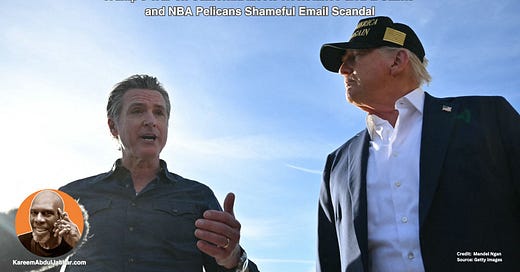Trump's War on California Meets Resistance & NFL Saints and NBA Pelicans Shameful Email Scandal
What I’m Discussing Today:
Kareem’s Daily Quote: A mediation on the meaning of winning.
California officials clap back at Trump's move to control school curriculum: California schools have chosen to teach children rather than indoctrinate them.
Expert describes Trump-ordered Northern California water release as "dumb": Trump lied then tried to cover it up by making things even worse.
New Orleans Saints Helped Catholic Church Do Damage Control During Sex Abuse Crisis: Sports franchises owe their fans more than this.
Kareem’s Video Break: An otter wants to share their precious stone—and we’re all the better for it.
UFC Fighter Apologizes After ‘Good Guy’ Hitler Comments: Phony apology from an athlete who fans should abandon immediately.
Karla Sofía Gascón Is “Deeply Sorry” for Resurfaced Tweets: “Light Will Always Triumph Over Darkness”: She should have been a hero, but her hateful comments have turned her into a villain.
Kareem’s Sports Moments: I love watching parkour, even though my stomach is churning the entire time.
Samara Joy Sings “The Christmas Song” featuring Antonio McLendon”: Samara Joy just won a Grammy for the album this song comes from. It’s like getting a Christmas present in February. You’re welcome.
Kareem’s Daily Quote
The only winner in the War of 1812 was Tchaikovsky.
Solomon Short
When I first read this quote, it made me stop and think and turn it over for a long time. My initial reaction was to laugh. It’s a witty response to the idea of most wars, but particularly this reference to Napoleon’s 1812 invasion of Russia, not the war in America. More people are familiar with Tchaikovsky’s 1812 Overture, Op. 49 with its dramatic canon sounds than they are with the causes or results of the war itself (despite the deaths of about 350,000 people).
So it is with many wars when seen from a safe distance. Not too long ago, we were bombing Vietnam and declaring it a threat to world safety. Now, MTV just hosted The Challenge reality competition show there. When we look back on the tremendous political, social, and cultural upheaval of the sixties, what is distilled from that turmoil are the movies, music, plays, and art inspired by the conflict. Sadly, some of the real issues of the time—civil rights, women’s rights, gay rights, etc.—are just as underwater as they were sixty years ago. Neil Young’s “Ohio” about the Kent State shootings could be easily adapted for today: “Tin soldiers and Trump is coming. We’re finally on our own.”
That led me to think about the concept of winning. Each person has to define what winning means to them because, in the pursuit of winning, you have to be sure you don’t give up more than you gain. If you do, then you’ve lost, regardless of the trophies or rings. I remember when I used to play pick-up basketball, I started with a bunch of guys who were on my same level. We were all friends. But as I got better, I had to choose between continuing playing with my friends, even though the play wasn’t as rigorous, or moving on to more challenging players, even if I didn’t like them as much. Youth will almost always choose to move on because to them, winning is almost always about bettering themselves at any cost. Friends are replaceable. Nothing unusual with that attitude when you’re young and finding yourself.
But when you’re older and hopefully wiser, the measurement of winning goes beyond the numbers on a scoreboard or in a bank account. To keep score, we look to our relationships, whose lives we’ve bettered, and what values we’ve stood strong on.
Every election cycle, politicians keep asking the voter, “Are you better off today than you were four years ago?” But the more important question today is, “Is this country better off today than it was one month ago?” This can be measured by examining a few core values of the U.S. Constitution. Are women’s rights better or worse? Are the civil rights of minorities better or worse? Is the safety of legal immigrants stronger or weaker? Are LGBTQ+ rights better or worse? Is the U.S. on better or worse terms with our international allies? Is the country’s security stronger or weaker? Is our economy stronger or weaker? Are you more proud of your country today than you were a month ago? Is our democracy more or less secure?
In other words, are we winning or losing?





